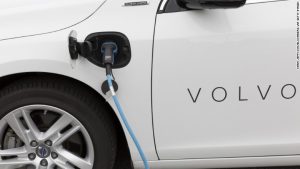Guest Post by Eric Peters
With gas cheaper than it has been in at least 50 years – strongly suggestive that there is plenty of it available and will be for some time to come – Volvo has announced its decision to build nothing but expensive plug-in hybrid and full-on electric cars beginning after the 2019 model year.
Cue the falling of rose petals.
“This announcement marks the end of the solely combustion engine-powered car,” saith Volvo’s CEO Hakan Samuelsson.
No, it marks the end of sanity – and very possibly of Volvo as a manufacturer of cars. Well, as a manufacturer of cars that people can actually afford to buy or want to buy and which aren’t massively subsidized by the government – from the assembly line to the moment they drive off the dealer’s lot.
It is my sincere desire to provide readers of this site with the best unbiased information available, and a forum where it can be discussed openly, as our Founders intended. But it is not easy nor inexpensive to do so, especially when those who wish to prevent us from making the truth known, attack us without mercy on all fronts on a daily basis. So each time you visit the site, I would ask that you consider the value that you receive and have received from The Burning Platform and the community of which you are a vital part. I can't do it all alone, and I need your help and support to keep it alive. Please consider contributing an amount commensurate to the value that you receive from this site and community, or even by becoming a sustaining supporter through periodic contributions. [Burning Platform LLC - PO Box 1520 Kulpsville, PA 19443] or Paypal
-----------------------------------------------------
To donate via Stripe, click here.
-----------------------------------------------------
Use promo code ILMF2, and save up to 66% on all MyPillow purchases. (The Burning Platform benefits when you use this promo code.)
But why is Volvo – why is the industry – so hell-bent on replacing cars that work with those that do not?
Especially now?

With gas prices going down rather than up?
It is the height of the summer driving season – when gas usually costs the most – and prices remain stable at around $2.00 per gallon. People notice this – and shop accordingly. Trying to sell them a hybrid or electric car when gas is cheap is like trying to get a cellulitic fat girl voted in as Miss Universe (though that is probably coming, in the spirit of “diversity”).
Did you know that sales of the Toyota Prius – the only somewhat reasonably priced hybrid car currently on the market – are down? And that Toyota had to give up trying to sell the not-reasonably-priced plug-in version of the Prius? (Which happens to be exactly the type of hybrid that Volvo will be making exclusively two years hence?)
This shouldn’t surprise anyone.
With gas at about $2.00 per gallon, spending $2,000 extra to buy a Prius ($23,475) vs. an otherwise similar but non-hybrid car like a base trim/four-cylinder Camry – which is actually a larger/nicer car than the Prius – does not make economic sense. It makes even less sense when you compare the cost of a Prius with the cost of something more directly comparable, such as a Corolla. You can buy one of those for $18,500 – which is $4,975 less than a Prius.
And about $15,000 less than the cost of the plug-in version of the Prius (RIP).
Volvo’s plug-in hybrids will be just as economically untenable – except worse. Because the price uptick will be even higher, given these are luxury cars. And an economical luxury car is as preposterous as a short giraffe.
You will never recoup the initial cost of a hybrid in down-the-road savings unless gas prices at least double – which is there is no sign of them doing, almost certainly because the supply is known to be vast if not essentially limitless.
This is why gas is so cheap. It must be so.
If it were not so, gas would be very expensive – and growing more so every hour.
The price of a commodity for which there is a huge market does not go down when supply decreases – or when there is the expectation of an imminent decrease in supply. Think about this a moment.
If the Peak Oilers and electric car-pushers were right and “peak oil” was just around the corner – as they have been insisting for the past 50 years – the price of gasoline would be hyperinflating like a Weimar Deutschmark.
This axiom of economic obviousness, however, cannot be mentioned by any establishment media journalist who wishes to keep his job – for the obvious reason that it makes a laughingstock of the stampede toward hybrid and electric cars, as if they were the only possible way to keep the wheels turning.
The organs continue to grind, producing near saturation coverage of Our Electric Future – so as to create the impression of its inevitability. And thus, it is hoped, the actuality.
Meanwhile, laws are passed outlawing affordable, efficient – and yes, clean – internal combustion-engined cars in European countries and requiring the manufacture of plug-in hybrid and electric ones.
This, by the way, is the real reason for Volvo’s announcement.
Volvo may indeed be “committed” to an electrified future, but that commitment has a lot to do with the laws and regulations on the books and soon-to-be-coming. It is why BMW and Mercedes have also grafted plug-in hybrid systems to almost every car they sell and cynically warble in tune with Volvo about unsere electrische zukunft.
There are areas in Germany where it is verboten to drive a car that isn’t rolling on battery power.
If they want to sell any cars at all, they must be plug-in hybrids or electrics.
And legislating these things into mass-production is the only way they will ever be mass-produced. Because absent laws requiring their manufacture, people – for the most part – are not going to buy them.
Not when gas is $2 per gallon and they can buy a car that costs thousands less than a hybrid and tens of thousands less than a plug-in hybrid or electric car.
But economics – and practicality – be damned.
The Agenda is all that matters. The car industry must be transformed. In spite of the fact that gas is cheap and hybrids and electric cars aren’t selling.
Precisely because of those facts, in fact.





Volvo is fortunate to have most of its market in countries where drivers don’t need to waste battery power running things like heaters, defrosters, lights, etc. during their normal driving.
Good point. But Eric is forgetting that this is something that Europe’s new muslim barbarian citizens are insisting upon. They are far greener and more socially liberal than legacy europeans.
Volvo is still in business?
“Volvo – they’re boxy, but they’re good”.
“Did you know that sales of the Toyota Prius – the only somewhat reasonably priced hybrid car currently on the market – are down?”
The only reason people bought these POS things was because you could use the car pool lane (in California, at least) while driving alone if you had one. That is no longer the case, and since these are shitty cars with nothing else to offer, nobody is buying them because the only reason to buy them has disappeared.
I think you can still use the car pool lane, while alone, if you have an electric car. But those suck so badly that it isn’t even worth it.
I really think there is a nice black market opportunity here, to secretly gut the electric vehicles and replace their shitty electric drive train with an internal combustion engine based one. You might have some explaining to do after an accident, but it’s probably worth the risk. You’d get to avoid the smog check bullshit, too – as an added bonus.
The Prius was a really reliable car. They also maintained high resale value. They were early mainstream adopters of the “integrated” car, which while it means little to me… was of high value to a lot of people. They sold well in areas that you couldn’t use the HOV lane.
http://www.consumerreports.org/cro/news/2011/02/the-200-000-mile-question-how-does-the-toyota-prius-hold-up/index.htm
An electric motor is far simpler and cheaper then an ICE. The problem has always been, and still is, a cheap battery with a high enough energy density.
As far as cost, governments are clearly going to subsidize so-called “green” cars.
One thing I’ve noticed in the hunt for a used car for my Mom is that the hybrid cars crater in value after 80-100k miles and 5 years of age. That’s probably why Volvo and the other manufacturers are steering toward hybrid and all electric – because doing a battery refresh in one of these cars will be prohibitively expensive- making those cars for all intents and purposes disposable. Where a traditional corolla, camry or civic is good for 300k miles, these electric cars will be heading for the recycle bin much sooner. It’s a car manufacturers wet dream.
Precisely. Used cars are in a hurry in being a thing of the past. The car manufacturer is taking no prisoners in their quest to “own” you!
Excellent point made Mr. Peter’s . It really is about Govt and industry in bed together. Perhaps in ten years time big brother will abscond our personal vehicles and force us to toe the line in the latest greatest Govt approved shitbox
Well can always keep rebuilding our old muscle cars from the 60s.Best looking cars ever designed in my humble opinion.
Except in the summer months, I never see a sixties car on the roads.
Half the people live in the salt belt.
It does not seem the EV will cut carbon emissions all that much if the recent studies about the CO2 emissions from the battery manufacture are correct.
I did some interesting calculations yesterday regarding EVs and their battery CO2 generation in the battery’s manufacture. There was a recent study in Sweden a week or two ago online about he CO2 payback on a car battery. It compared two battery capacities; 30 and 100 kwhr (Nissan Leaf and Tesla).
The Swedish report states that 150 to 200 KG CO2 is expelled in the manufacture of a rechargeable car battery. The emissions are lineally proportional to the size of the battery. I found a PDF online from Chinese EV builders estimating it to be 2700-3060 kg for a 27 kwhr battery. That works out to 100 – 113 kg CO2. The calculation once this data is known, is very straight forward. The data from both studies ranges from 100 to 200 kg CO2/kwhr capacity.
Assume the battery lasts for 250,000 km. A battery’s life is a function of its use and its age. If you don’t use a Li-ion battery it will still degrade over time and it is also dependent on how fast you change and discharge it, as will as the number of times it is cycled.
A number/measure that is important in this industry is CO2/km. Think of it as opposite of CO2 gas mileage. The lower the number the better. A 40 mpg gasoline car (5.875 Liters/100 km) will emit around 13.3 grams of CO2 per mile from burning gasoline. That is entirely a function of mileage for a given fuel type.
Let’s assume the low end at 113 kg CO2/kwhr capacity and 250,000 km life. There are 1000 grams in a kg. The Nissan Leaf now has a 30 kwhr battery. 30 x 113,000 /250,000 = 13.56 grams/km. Even if the battery is charged from zero CO2 emission sources, It is no better on the CO2 balance calculation than a gasoline engine.
Sure the EV without the battery has a lower carbon foot print since an engine and transmission have a lot more components than an EV, the literature online puts the EV at a 30-40% larger carbon foot print when the battery is included.
https://www.thegwpf.com/new-study-large-co2-emissions-from-batteries-of-electric-cars/
http://www.mdpi.com/2071-1050/9/4/504/pdf
I’ve read many of your rants about electric cars. I purchased a Nissan Leaf in 2011 because I wanted to reduce my exposure to gas stations. There are many reasons why I dislike gas stations. I think they are unsafe and will become much more so when this phony economy that has been propped up by the Fed Elite complex decides it’s time to implode it (again). Meanwhile I drive my 30-40 miles per day and plug in when I get home. The next day I don’t have to question whether or not I need to stop to buy gas. I’ve already purchased much cheaper electricity (thanks for the tax subsidy, Eric, I appreciate it) the night before.
I have a separate meter for my Leaf to keep the electricity cost at rock bottom and I never have to change oil or add water to my radiator because electric cars don’t need them. No transmissions to worry about either. And my Leaf will probably leave your guzzler in the dust when the signal turns green if I decide I want to drive ahead of your tailpipe. I don’t care that they burn coal to generate my electricity and neither do you when you power on your computer to write your EV rants. I hate gas stations. Sue me!
Hybrid cars are a joke. We had a hybrid rental car while on vacation in Hawaii. The engine would shut down at intersections while stopped as designed to “save the environment”. The problem was it wouldn’t start up again when we were ready to go. Try dealing with that in the middle of busy Honolulu or at the only Costco gas station on the island. It was a nightmare! Car only had 3000 miles on it to boot. No thanks, gasoline power will do fine.
— “The problem was it wouldn’t start up again when we were ready to go.”
You had a broken car. I once had a V8 that I had to get out and push in order to build up enough pressure in the transmission for it to catch.
— “No thanks, gasoline power will do fine.”
Start/stop isn’t just on hybrids.
https://www.edmunds.com/car-reviews/features/do-stop-start-systems-really-save-fuel.html
Gas *is* expensive everywhere except the USA. Why? Because back in the 50’s, the USA bought all of Saudi Arabia’s oil in exchange for providing “security” for the Sauds. This is the source of America’s wealth.
the last figures I’ve seen, the US imports less than 20% of its crude from SA. US imports more oil from Canada and maybe Mexico (?)
2.3MM from Canada
400m from Mexico
500m from saudia shithole
Paul,
There seems to be something about “fungible” that you don’t understand.
The reason gas is now cheap here than most of the West is a combination of lower taxes and the output of “Drill, baby, drill!”.
Our push for oil development has reduced oil prices on a worldwide basis as it has taken effect.
A) I’ve never found any info on how these batteries perform in cold weather.
B) Why does everyone assume plugging a car in to recharge the battery is FREE. Electricity costs money and the price of electricity increases faster than gas.
C) How good is electric on long trips? The distances I’ve seen suck.
D) Refueling with gas takes a couple minutes. Re-charging with electricity takes hours.
E) Why does everyone assume electrical power generation is ‘green’? How green is coal-fired, oil-fired or gas-fired power generation?
Personally I think the Prius enjoyed the success that it did in part because of its looks. It was recognizable. When there are too many variations on the market, the pompous fools will lose their status symbol if others don’t know they are making a statement.
The estimates of the recoverable oil in the ground of the USA is from 30 billion to 50 billion barrels. We have become very good at getting oil out of the ground. We take 3.5 billon barrels out each year. Yes, all gone in 10 to 17 years.
I’m glad that I’m 67.
There are 60 years worth of oil outside the US, and in 10 years, if we want oil I hope the dollar still has value that will buy oil.
$ 2 gas reflects our skill at getting the last oil out of the ground.
I have a large long oil position and expect to make a lot of money.
The same is true of our reservoirs, figure the total gallons in them and the rate of usage and we are going to be out of water soon.
FWIW, the end of oil has been predicted since the petroleum farmers first started going out of business back in the late 1800’s and the need for returning to Whale Oil was being predicted.
But there is some basis in believing petroleum is a renewable fuel source, old fields that were once completely dry now becoming productive again.